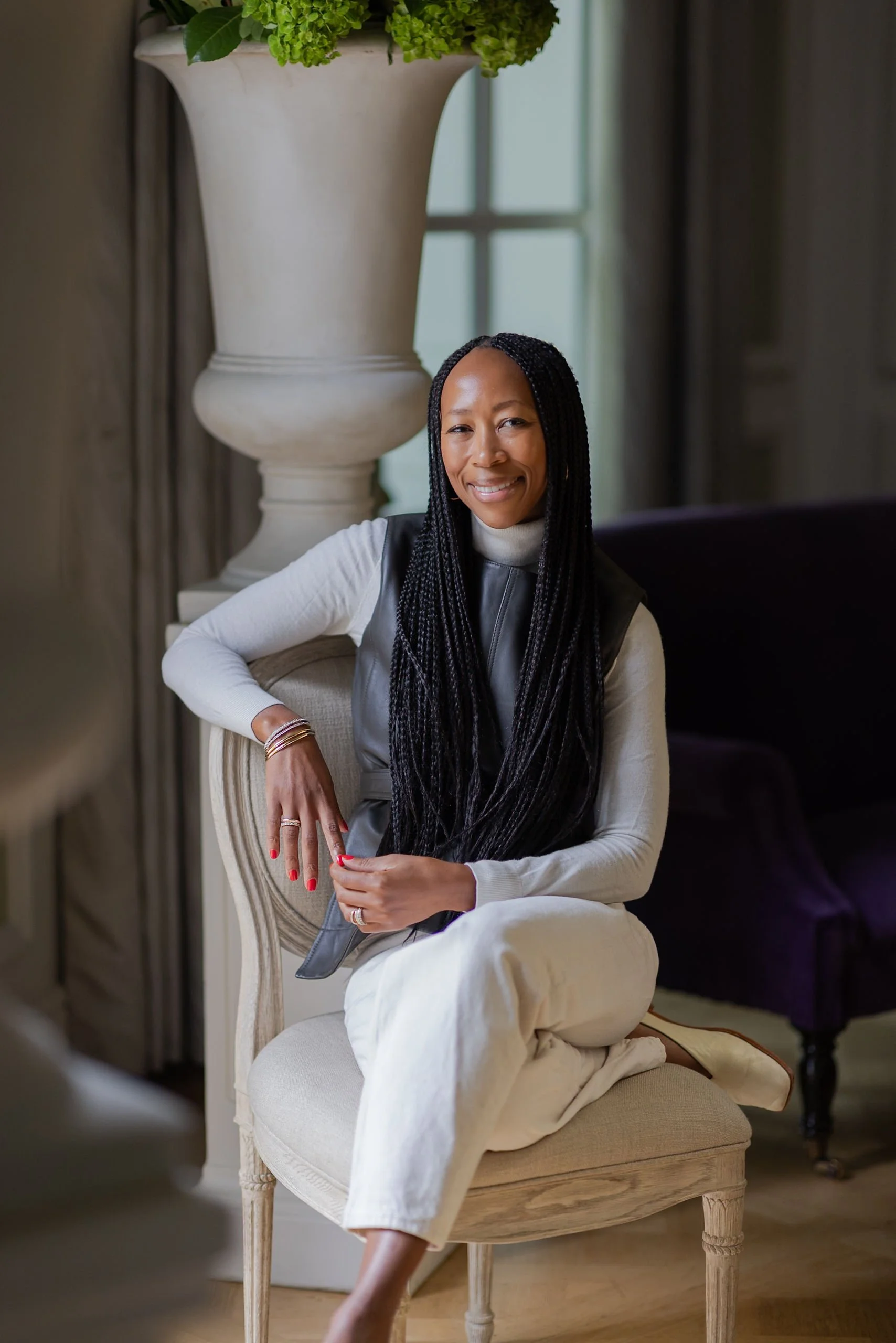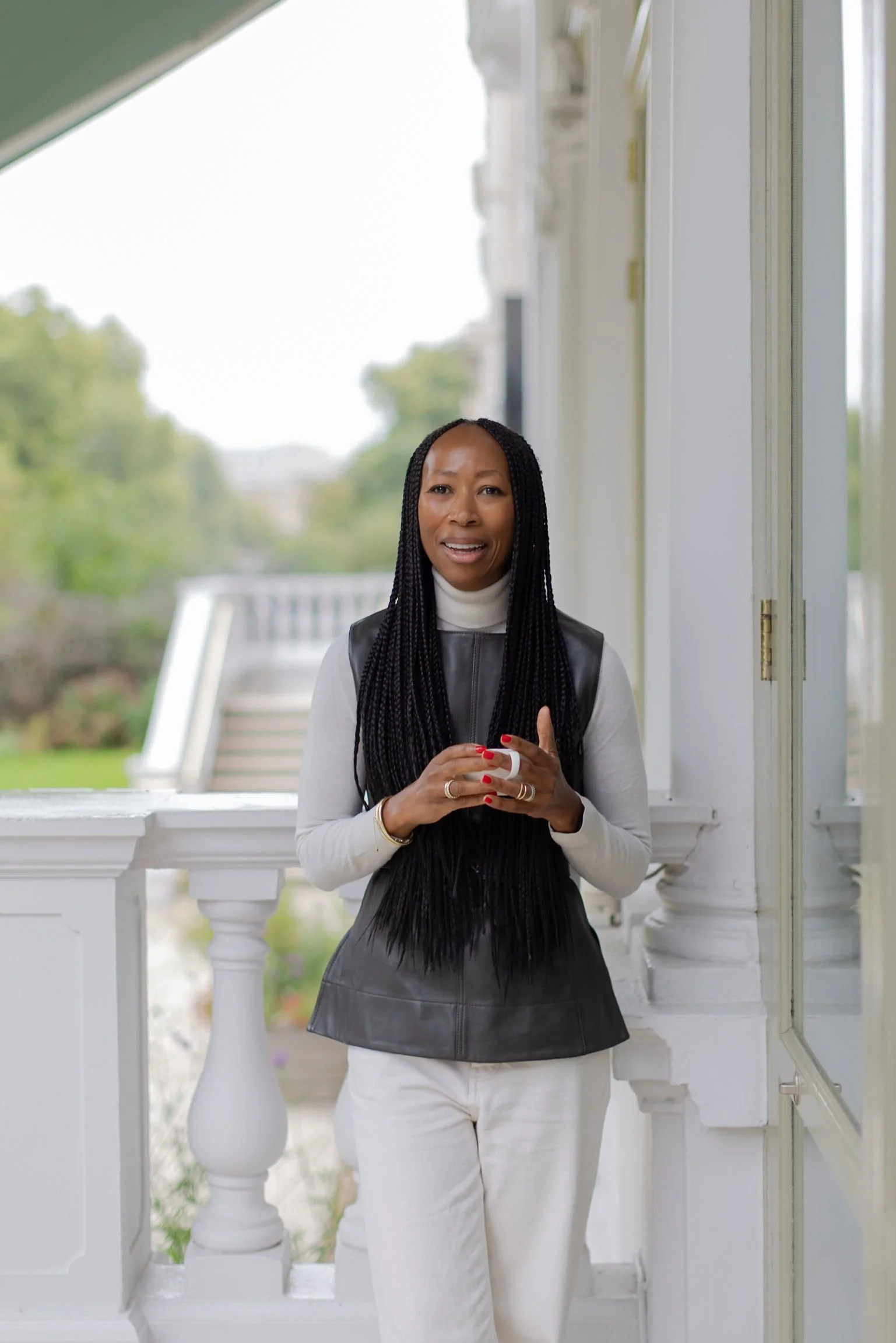Motherhood Rising: In Conversation with Thandi Maqubela
We’re proud to continue our editorial series in partnership with celebrated portrait photographer Susheel Schroeder, celebrating the resilience, renewal, and identity of mothers in the postpartum journey. Through intimate portraits and personal stories, Motherhood Rising captures the quiet power of motherhood and the beauty of recovery.
In this feature, we sit down with Thandi Maqubela, South African–born legal director and mother of two, to explore how she balances ambition with presence, the evolution of identity after birth, and what it means to redefine success on her own terms.
Looking back, what do you wish had been more available to you in those early weeks?
From a knowledge perspective I wish I had known more about what to expect, though I wonder if every mother feels the same because it is such a shock to the system. I think we’re pretty informed about what to do up to the birth but it feels like immediately after birth there is just a drop off of information and what we should expect. There were a few complications when I had my son so we had to stay in the hospital for 5 days, which at the time was quite jarring but at the same time was comforting to have the support of the midwives who would constantly check on us. A few months after the fact I could look back and say, I really needed that. My situation was a little different because I’m from South Africa and didn’t have any of my family around me in London during that postnatal period due to it being the Covid years. If I had had my mum, my sisters and my aunts around maybe I would have felt a little less at sea. My husband was amazing and did everything he could, but there are just certain things you need the women in your life for, or women who can care for you, to be around for. I remember a friend said to me, just before I gave birth, if things are feeling tricky, just whisper to yourself ‘this too shall pass’ and that massively helped me, and it's something I've gone on to share with new mothers.
“From a knowledge perspective I wish I had known more about what to expect, though I wonder if every mother feels the same because it is such a shock to the system.”
How did you feel your identity changed or transitioned after having your son?
I took quite a lot of time off for maternity leave and towards the end I started feeling like I was losing myself a little and I needed to get back to that other part of myself and go back to work. When I did get back to work I felt that I had something that was just for me and I felt a sense of self again, not that you don’t have that as a mother, it’s a beautiful thing, but I didn’t want to lose myself in motherhood. That’s not to cast aspersions on any mother that chooses to stay home with their child and forego the career aspect, that’s totally fine and I have huge respect for that. But for me, my career is such an intrinsic part of who I am and I really enjoyed getting back to it. The moments that I was away from my child also made me miss him more so. To have both of those worlds works really well for me.
What support did you have to enable you to start going back to work?
Initially my son was with a childminder because I felt a smaller setting was good for him and then when he was 2, we put him into nursery and had wraparound care. I wouldn’t have been able to do it without that support. Culturally in South Africa you typically have someone at home who helps you with your children. It absolutely is a privilege given the financial implications. Structurally the childcare system in the UK doesn’t support women returning to work when their children are young and so you need wraparound care if you want to do that. Childcare can be very prohibitively expensive in the UK. We spent time with Swedish friends of ours recently and saw how different it is there where there is so much support and the cost of childcare is a lot more manageable. The primary focus of that system is supporting women back in to the workplace which is ultimately better for the economy and everyone in society. It’s an impossible ask for women here and can make us feel like we’re not doing enough, when the reality is there is just not enough support. I think a lot of strides have been taking in the workplace to improve equality and flexible working but there is still a long way to go.
Did you feel there were gaps in the care you received from the healthcare service post birth?
I think there is a lot of focus on postpartum depression (rightly so) but less on other mental health conditions. I know about postpartum anxiety only because I struggled with that for a long time and no one quite caught on to it during any of the checks I had. The only person that twigged that something was up, was a doctor we saw for my son who recognised I was struggling with it and gently suggested I speak to someone. I was so grateful because it felt like someone was giving me permission to acknowledge it and put a name to it. Off the back of that I was able to get help but that was almost 2 years in so I had been living with it without support for such a long time. It feels like the primary concern for medical professionals is, can you care for your child? Can you feed them? Which is great but I think there is a very big chasm between that and the concern for the person doing the caring of the child.
How do you find balance between caring for yourself and caring for your son? How do you support your wellbeing?
My thoughts on this are informed by some advice my aunt gave me - put yourself first and everything else will follow, your marriage, children, all of it. Basically make sure you’re looking after yourself. I try to put my mental, physical and emotional health first because I know if I’m good then I can look after them too and give them the attention that they need. It’s not easy but I’ve become quite regimented about it. I know in the morning I need to exercise or go for a run to keep my mind clear and I know I need to have a few hours for myself at the weekend. My husband also recognises that I need that, to recalibrate and he's my biggest champion in this regard, actively supporting me because he knows how important it is to me. It took me a while to find my stride but I feel like we’re here now, at least for now.





